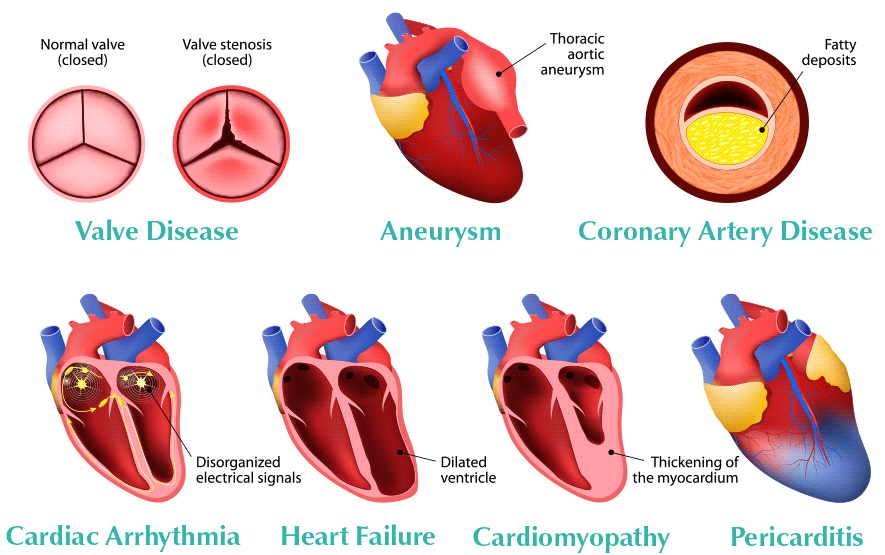What you need to know about Heart Surgery
Contents
Heart surgery is any type of surgery performed to correct problems with the heart if other treatments cannot be used or have not worked. It can be done for both children and adults. Numerous problems can be addressed with heart surgery, including amyloidosis, arrhythmia, cardiomyopathy, aortic disease, coronary artery disease, heart failure, hypertrophic cardiomyopathy, congenital heart disease, vulvar heart disease, and pericarditis.
Your doctor may use heart surgery to:
-
Replace or repair heart valves that don’t work well
-
Treat heart failure and coronary heart disease (CHD)
-
Place medical devices to help support heart function
-
Control abnormal heart rhythms
-
Replace a damaged heart with a healthy one from a donor.

What does the Procedure Involve?
There are various types of heart surgery. The following are some of the most common types:
Coronary artery bypass graft (CABG)
This surgery is usually used to treat patients with severe coronary heart disease (CHD). It can improve the blood flow to your heart. In CABG, a healthy vein or artery from another area of your body is taken and connected to the blocked coronary artery to supply blood. The grafted vein or artery goes around (bypasses) the blocked part of the artery, making a new path for your blood to flow to the heart muscle. During one surgery, surgeons can bypass multiple blocked coronary arteries.
Percutaneous coronary intervention (PCI) or coronary angioplasty
PCI is another treatment for CHD. It involves the insertion of a thin, flexible tube with a balloon at its end through a blood vessel to the blocked or narrowed coronary artery. Once the tube is in place, your surgeon inflates the balloon to push the plaque against the artery wall or to widen the narrowed artery. This is done to restore blood flow. A stent may also be placed to help keep the artery open.
Heart valve repair or replacement
Heart valve repair or replacement is used to treat damaged or diseased valves, or when your heart valves do not work the way they should. Your surgeon can either repair the valve or replace it with man-made or biological valves. Biological valves are made from cow, pig, or human heart tissue and may also have man-made parts.
One way to repair the valve is by inserting a catheter with a small balloon at the tip through a large blood vessel. The catheter is then guided to the heart and the balloon is inflated and deflated to widen a narrow valve.
Heart transplant
A heart transplant is mostly performed on patients with end-stage heart failure. This surgery involves removing a patient’s disease heart and replacing it with a healthy one from a deceased donor.
Insertion of a pacemaker or an implantable cardioverter-defibrillator (ICD)
The insertion of a pacemaker or ICD is used to treat arrhythmia when medication does not work.
A pacemaker is a tiny device placed under the skin of your chest or abdomen. The device is connected to your heart chambers through wires. It can control your heart rhythm using low-energy electrical pulses.
An ICD is similar to a pacemaker. It is a small device placed under the skin of your abdomen or chest and is connected to your heart through wires. It is used to check your heartbeat for dangerous arrhythmias by sending an electric shock to your heart, which will restore your heart rhythm to normal.
Maze surgery
This is another treatment for arrhythmia. This surgery involves creating a pattern of heart tissue inside the upper chambers of the heart to transmit electrical signals along a controlled path to the lower heart chambers.
Aneurysm repair
Aneurysm repair involves replacing a weak section of the heart or artery with a graft or patch. This is done to repair a balloon-like bulge within the wall of the heart muscle or the artery.
Surgery to place Ventricular Assist Devices (VAD) or Total Artificial Hearts (TAH)
If you have heart failure that is not responding for treatment or if you are waiting for a heart transplant. Your doctor may recommend VAD insertion. A VAD is a mechanical pump that can support the function of your heart and your blood flow if you have a weak heart.
If both of your ventricles do not work well due to end-stage heart failure, TAH may be used. A TAH is a device used to replace the ventricles (the two lower chambers of the heart).
Transmyocardial Laser Revascularization (TMR)
TMR is used to treat angina when other treatments do not work. It involves creating small channels through the muscle of the heart into the lower left chamber of the heart using lasers.
Different surgical approaches can be used to perform the types of heart surgery mentioned above. The surgical approach depends on your specific problem, general health, and other factors. Below are the surgical approaches to perform heart surgery:
-
Open heart surgery is any kind of surgery in which a surgeon creates a large cut in the chest to open the rib cage to expose the heart and operate on it. In some cases, the surgeon may also open the heart. With this surgical approach, your heart is not beating. Instead, it is connected to a heart-lung bypass machine that takes over the heart’s pumping action.
-
Off-pump heart surgery is usually used to do CABG. It is similar to open-heart surgery, but your heart is not stopped and a heart-lung bypass machine is not used.
-
Minimally invasive heart surgery involves creating small incisions in the side of your chest between the ribs. It may or may not use a heart-lung bypass machine. The incisions are created to insert small tools. In some cases, thin robotic arms may also be used to help your surgeon (robotic-assisted surgery).
How Long Should I Stay at my Destination?
You will likely have to stay in the hospital for several days after heart surgery. It is recommended that you stay in the local area for at least 10 to 14 days for initial recovery and follow-up checkups.
What’s the Recovery Time?
Recovery can vary, depending on the type of heart surgery you have and the surgical approach used. Your doctor will let you know when you can resume your normal activities. Full recovery can take 6 to 12 weeks or more. Open heart surgery normally requires a longer recovery time.
What About Aftercare?
Your doctor will give you a set of aftercare instructions, including how to care for your wound, recognize signs of infection, and deal with the after-effects of surgery. You may be given medications after surgery. Make sure to take the medications exactly as prescribed to avoid complications and to get the best results.
Ongoing care is often needed, these include regular checkups with your doctor (you may do these checkups with your local doctor at home), cardiac rehabilitation, and healthy lifestyle changes.
What’s the Success Rate?
The results of heart surgery are often excellent and the surgery is generally very safe. However, it has risks, such as bleeding, infection, inflammation, swelling, fever, damage to other organs, and stroke.
The risk of complications is generally higher if heart surgery is performed in an emergency situation, such as during a heart attack. It is also higher if the patient has other diseases, such as diabetes.
Are there Alternatives to Heart Surgery?
Heart surgery is not always necessary to treat heart-related problems. In some cases, your doctor may recommend medications or nonsurgical procedures to address the problem. For instance, to prevent abnormal electrical signals from moving through your heart, your surgeon may use a procedure called catheter ablation.
For an in-depth analysis of a Heart Surgery Procedure, watch this short video.
To check prices or to book a Heart Surgery Procedure, in Thailand or anywhere else in the world, head on over to MyMediTravel now!

